35 Most Common Business Development Interview Questions
Preparing for a business development interview can be a crucial step in landing your next role. Whether you’re a seasoned professional or new to the field, understanding the key questions typically asked can help you showcase your skills and experience effectively.
Here, we’ll cover 35 of the most common business development interview questions, along with tips on how to answer them to stand out and demonstrate your potential to drive growth and success for any organization.

Behavioral & Technical Questions
1. Tell us about yourself
What Interviewers Want:
A brief overview of your professional background, key achievements, and how they relate to the business development role.
Strong Answer:
“I have over three years of experience in business development, focusing on identifying growth opportunities and building lasting client relationships. At my last job, I helped increase sales by 20% in one year by implementing targeted outreach campaigns and developing new partnerships. I’m excited to bring my skills in market analysis, client negotiation, and relationship building to your company.”
Poor Answer:
“I have some experience in sales and have worked in customer service roles. I’m looking for a new challenge and think business development might be a good fit for me.”
2. Why do you want to work with us?
What Interviewers Want:
Insight into why you’re interested in the company, their culture, or their products/services and how your goals align with theirs.
Strong Answer:
“I admire your company’s innovative approach in the tech industry, and your mission to make a real impact in the market aligns with my passion for developing long-term partnerships and expanding business. I believe my experience in business development would complement your growth strategy, and I’m excited to contribute to that.”
Poor Answer:
“I’ve heard your company is a good place to work, and I think it would be a great opportunity for me.”
3. What is your experience with market research?
What Interviewers Want:
Details on how you approach market research, what tools you use, and how you apply research findings to inform business strategies.
Strong Answer:
“In my previous role, I conducted market research to identify new business opportunities and assess competitor strategies. I used tools like Google Trends, SEMrush, and customer surveys to gather data and insights. This allowed me to craft targeted marketing strategies, resulting in a 15% increase in lead generation over six months.”
Poor Answer:
“I haven’t done much market research, but I’m open to learning it.”
4. How do you handle objections from clients?
What Interviewers Want:
Demonstrates your ability to remain calm and professional while addressing client concerns, ultimately leading to a positive resolution.
Strong Answer:
“I listen attentively to the client’s concerns, validate their feelings, and then present a solution that addresses their needs. For example, when a potential client was hesitant about pricing, I highlighted the long-term value and ROI of our services, which eventually led to closing the deal.”
Poor Answer:
“I try to convince them to change their mind as quickly as possible. If they still don’t agree, I move on.”
5. Can you describe a successful business development project you’ve worked on?
What Interviewers Want:
Evidence of your experience, strategy, and results in driving successful business development initiatives.
Strong Answer:
“At my last job, I led a campaign to target a new demographic through strategic partnerships with local businesses. By identifying shared goals, we were able to cross-promote our services and increase sales by 30%. It was a great example of leveraging collaborative efforts to achieve mutual growth.”
Poor Answer:
“I worked on a few projects, but they didn’t really go anywhere. I just helped out where I could.”
6. How do you prioritize your business development tasks?
What Interviewers Want:
A clear explanation of how you manage your time and prioritize tasks that align with business goals.
Strong Answer:
“I prioritize tasks based on their potential impact on revenue and business growth. I start by identifying high-value prospects, and then focus on nurturing relationships with those leads. I also keep track of ongoing projects and deadlines using tools like Trello to stay organized.”
Poor Answer:
“I usually just do whatever feels urgent at the time. I handle things as they come up.”
7. How do you identify new business opportunities?
What Interviewers Want:
Insight into your approach to spotting new growth areas, understanding market trends, and identifying untapped opportunities.
Strong Answer:
“I identify new opportunities by staying informed about industry trends, conducting competitive analysis, and engaging with current clients for feedback. For example, I noticed a gap in the market for certain digital services, so I pitched a new product line that increased our revenue by 25%.”
Poor Answer:
“I just wait for leads to come to me, and if I see something interesting, I follow up.”
8. What is your approach to cold calling?
What Interviewers Want:
Your method for reaching out to new leads and turning initial contacts into meaningful business relationships.
Strong Answer:
“I approach cold calling with a focus on building rapport. I begin by introducing myself and briefly explaining how I can help the prospect solve a problem. I always tailor my pitch to address their specific needs and ensure a personal touch. This approach has helped me achieve a 30% response rate in my previous role.”
Poor Answer:
“I don’t like cold calling. It feels uncomfortable, but I do it when required.”
9. How do you maintain long-term relationships with clients?
What Interviewers Want:
Your ability to build and nurture lasting business relationships that go beyond initial sales.
Strong Answer:
“I maintain long-term relationships by staying in regular contact with clients, offering solutions to their evolving needs, and making sure they feel valued. I also follow up after each project to ensure satisfaction and ask for feedback to improve our services.”
Poor Answer:
“I check in with clients every once in a while, but I don’t have any particular strategy for maintaining relationships.”
10. Can you explain your sales process?
What Interviewers Want:
A structured, step-by-step approach to how you move prospects through the sales pipeline and close deals.
Strong Answer:
“My sales process starts with identifying potential leads, followed by researching their needs. I then initiate contact, pitch the solution, and address any objections. Once the client shows interest, I work on closing the deal, and then I focus on post-sale support and relationship management.”
Poor Answer:
“I just try to sell the product as best I can. If the customer is interested, they buy.”
11. How do you approach negotiations?
What Interviewers Want:
Your ability to handle negotiation situations and create win-win outcomes.
Strong Answer:
“I approach negotiations with a focus on collaboration rather than confrontation. I listen to the client’s needs, and then I propose a solution that benefits both parties. I ensure that the terms align with both our objectives and maintain open communication throughout the process.”
Poor Answer:
“I aim to get the best deal possible for my company, even if it means pushing the client hard.”
12. How do you measure the success of your business development efforts?
What Interviewers Want:
Your ability to track and assess performance using key metrics.
Strong Answer:
“I measure success by looking at metrics like revenue growth, the number of new partnerships, and client retention rates. For example, I track the number of leads generated through outreach campaigns and evaluate the conversion rates to gauge effectiveness.”
Poor Answer:
“I just rely on the overall success of the company to measure how well I’m doing.”
13. What strategies do you use to research competitors?
What Interviewers Want:
How you gather insights on competitors and how that information informs your strategy.
Strong Answer:
“I use online tools like SEMrush and Google Alerts to track competitors’ activities and pricing strategies. I also visit their websites and social media pages to assess their strengths and weaknesses. This helps me position our offerings in a way that highlights our unique advantages.”
Poor Answer:
“I don’t do much competitor research. I focus on what we offer.”
14. Tell me about a time you turned a negative client relationship into a positive one
What Interviewers Want:
Your problem-solving skills and ability to maintain a positive professional image even in challenging situations.
Strong Answer:
“One client was dissatisfied with the delivery times of our product. I listened to their concerns, acknowledged the issue, and worked closely with the operations team to offer expedited services. By keeping the client informed and addressing their needs, I was able to turn the situation around, and they became one of our most loyal clients.”
Poor Answer:
“I usually avoid dealing with unhappy clients. If they’re not satisfied, I just let them go.”
15. What is your experience with CRM software?
What Interviewers Want:
How familiar are you with using CRM tools to manage and track client relationships and sales activities.
Strong Answer:
“I’ve worked extensively with CRM systems like Salesforce and HubSpot to manage client interactions and track sales progress. I use them to maintain up-to-date client information, segment leads, and automate follow-up tasks, ensuring a smooth process from prospecting to closing.”
Poor Answer:
“I haven’t used CRM software much, but I’m willing to learn.”
16. How do you handle rejection in sales?
What Interviewers Want:
Your ability to bounce back from rejection and continue pursuing business development goals.
Strong Answer:
“I see rejection as an opportunity to learn. After each rejection, I try to understand why the prospect said no and use that feedback to refine my approach. I keep a positive attitude and stay motivated, knowing that rejection is part of the process.”
Poor Answer:
“I don’t handle rejection well and find it discouraging. It sometimes makes me hesitant to reach out to new clients.”
17. What do you think are the most important skills for business development?
What Interviewers Want:
Your understanding of the key skills that drive success in business development.
Strong Answer:
“I believe the most important skills are communication, negotiation, relationship building, and problem-solving. These skills help you connect with clients, address their needs, and drive mutually beneficial partnerships.”
Poor Answer:
“I think sales skills are most important, but the other skills don’t matter as much.”
18. How do you ensure that a business deal stays on track?
What Interviewers Want:
Your ability to maintain control of the sales process and ensure timely delivery of promises.
Strong Answer:
“I maintain regular communication with the client throughout the process, setting clear expectations and milestones. I also use project management tools to track progress and proactively address any potential issues before they escalate.”
Poor Answer:
“I trust the team to handle things and don’t usually get involved unless there’s a problem.”
19. How do you stay up to date with industry trends?
What Interviewers Want:
Your commitment to continuous learning and staying current with market changes.
Strong Answer:
“I regularly read industry blogs, attend webinars, and participate in networking events. I also follow thought leaders on LinkedIn and engage in online forums to stay informed about the latest developments.”
Poor Answer:
“I don’t really follow trends. I focus on doing my job.”
20. How do you tailor your approach to different types of clients?
What Interviewers Want:
Your flexibility in adapting your approach based on the needs and preferences of different clients.
Strong Answer:
“I take the time to understand each client’s specific goals and challenges. For example, if I’m working with a small startup, I focus on providing cost-effective solutions and flexible terms. For larger enterprises, I emphasize long-term value and scalability.”
Poor Answer:
“I use the same approach for all clients. I think it works just fine.”
21. Describe a time when you had to manage a high-pressure situation
What Interviewers Want:
How you handle stress and maintain productivity under pressure.
Strong Answer:
“During a crucial pitch to a potential partner, we encountered unexpected technical difficulties. I stayed calm, reassured the client, and shifted to a discussion about our value proposition while the issue was resolved. This helped maintain their trust, and we successfully closed the deal.”
Poor Answer:
“I don’t really handle pressure well, and I usually try to avoid high-stress situations.”
22. How do you manage a large pipeline of leads?
What Interviewers Want:
Your organizational skills and ability to manage multiple prospects efficiently.
Strong Answer:
“I prioritize leads based on their readiness to buy, segmenting them into categories such as hot, warm, and cold. I then use CRM software to automate follow-ups and reminders, ensuring that I’m consistently nurturing high-potential leads.”
Poor Answer:
“I just work with the leads that come to me first, and sometimes I forget to follow up.”
23. How do you handle competing priorities?
What Interviewers Want:
Your ability to juggle multiple tasks and focus on what’s most important.
Strong Answer:
“I use a task management system like Asana to keep track of all my responsibilities. I focus on high-impact activities first, and if necessary, I delegate tasks to other team members to ensure everything stays on track.”
Poor Answer:
“I tend to focus on whatever seems urgent and handle everything else when I have time.”
24. Can you describe your experience with contract negotiations?
What Interviewers Want:
Your familiarity with handling legal agreements and negotiating terms to benefit both parties.
Strong Answer:
“I’ve worked closely with legal teams to negotiate terms on contracts, ensuring that both parties are clear on deliverables and expectations. I focus on creating agreements that protect the interests of both parties while ensuring a positive working relationship.”
Poor Answer:
“I’ve never really handled contracts, but I’m willing to learn.”
25. How do you align business development goals with the overall strategy of the company?
What Interviewers Want:
Your ability to connect individual sales goals with broader company objectives.
Strong Answer:
“I ensure that my business development efforts align with the company’s vision by regularly collaborating with leadership to understand key objectives. For example, if the goal is to expand into new markets, I focus on building relationships with potential partners in those regions.”
Poor Answer:
“I focus on meeting my personal targets, and the company’s strategy doesn’t really affect my approach.”
26. What do you consider the biggest challenge in business development?
What Interviewers Want:
An understanding of the industry challenges and how you approach overcoming them.
Strong Answer:
“One of the biggest challenges is identifying the right target audience and crafting personalized solutions. It requires continuous market research and adapting to evolving customer needs. However, I see this challenge as an opportunity to refine my approach and stay ahead of competitors.”
Poor Answer:
“Business development is hard because there’s always too much competition.”
27. How do you measure client satisfaction?
What Interviewers Want:
Your approach to gauging and ensuring that clients are happy with your service.
Strong Answer:
“I measure client satisfaction by regularly soliciting feedback through surveys and follow-up calls. Additionally, I monitor retention rates and the number of referrals a client provides, as these are strong indicators of satisfaction.”
Poor Answer:
“I don’t really track satisfaction. If a client doesn’t complain, I assume everything is fine.”
28. What’s your approach to handling a high volume of inquiries?
What Interviewers Want:
Your ability to manage and prioritize large volumes of communication without losing quality.
Strong Answer:
“I use a CRM to organize and track all inquiries, and I set up automated responses to ensure timely follow-ups. I also prioritize based on the urgency of each inquiry, ensuring that high-potential leads receive immediate attention.”
Poor Answer:
“I try to respond to as many as I can, but it’s hard to keep up with everything.”
29. What sets you apart from other candidates applying for this role?
What Interviewers Want:
A demonstration of what makes you uniquely qualified for the job.
Strong Answer:
“My experience in both sales and market research gives me a comprehensive view of business development. I can not only identify new opportunities but also create targeted strategies to capitalize on them. Additionally, I’m adaptable and always looking for ways to improve and innovate.”
Poor Answer:
“I don’t know, but I’m sure I can do the job just fine.”
30. Where do you see yourself in the next five years?
What Interviewers Want:
Insight into your long-term career goals and how they align with the company’s growth.
Strong Answer:
“In the next five years, I see myself taking on a leadership role in business development, helping to guide a team of professionals while driving strategic initiatives. I’m eager to grow with a company that values innovation and personal development.”
Poor Answer:
“I’m not sure. I just take things one day at a time and go wherever the job takes me.”
31. How do you build and maintain a strong professional network?
What Interviewers Want:
An understanding of how you leverage networking to create business opportunities and maintain connections.
Strong Answer:
“I build my network by attending industry events, participating in webinars, and engaging on professional platforms like LinkedIn. I make an effort to nurture relationships by providing value, offering insights, and staying in touch through regular follow-ups.”
Poor Answer:
“I don’t focus much on networking. I rely on my current contacts when needed.”
32. Can you share an example of a time when you exceeded your sales target?
What Interviewers Want:
Evidence of your ability to outperform expectations and achieve business development goals.
Strong Answer:
“Last quarter, I exceeded my sales target by 40%. I achieved this by identifying an underserved market segment, tailoring our offerings to meet their specific needs, and using a targeted outreach strategy. The result was a significant increase in leads and conversions.”
Poor Answer:
“I don’t really track my sales targets, but I always try to meet them.”
33. How do you ensure that your business development strategies align with the marketing team’s efforts?
What Interviewers Want:
Your ability to collaborate with cross-functional teams to create unified strategies.
Strong Answer:
“I ensure alignment by regularly meeting with the marketing team to discuss campaign goals, target audiences, and messaging. By working closely with them, I can refine my approach to ensure we’re both targeting the same prospects and delivering consistent messaging.”
Poor Answer:
“I work on my business development strategy independently and don’t really coordinate with marketing.”
34. How do you handle objections during the sales process?
What Interviewers Want:
Your ability to handle challenges and objections while maintaining a positive relationship with the prospect.
Strong Answer:
“When faced with objections, I listen carefully to the prospect’s concerns and acknowledge their point of view. Then, I provide a solution or clarification that addresses their concerns while highlighting the benefits of our offering. This approach often helps turn objections into opportunities for deeper engagement.”
Poor Answer:
“I try to push through objections and convince the prospect that they’re wrong.”
35. Why do you want to work for this company?
What Interviewers Want:
Your motivation for applying to the company and how your goals align with its mission and values.
Strong Answer:
“I’ve always admired your company’s commitment to innovation and customer-centric approach. I believe my background in business development and passion for building lasting relationships align perfectly with your goals. I’m excited about the opportunity to contribute to the growth of such a dynamic and forward-thinking company.”
Poor Answer:
“I’m just looking for a job, and your company seems like a good place to work.”
Explore these helpful interview guides
AI Mock Interview Practice: A Game Changer for Job Seekers
If you are looking to enhance your interview preparation, AI Mock Interview Practice could be your game changer. With AI-powered platforms, you can simulate real-time interviews that assess your skills, responses, and confidence.
This practice will help you:
- Build Confidence – AI mock interviews give you a realistic feel of the actual interview environment, reducing anxiety and helping you build confidence.
- Improve Answer Structure – AI will provide you with feedback on how to structure your answers better, improving clarity and flow.
- Gain Insight into Common Questions – AI models can generate common interview questions based on the job position you’re applying for, helping you prepare thoroughly.
- Real-Time Feedback – After the mock interview, you will receive instant feedback on areas you need to improve, whether it’s in your body language, tone, or answer delivery.
- Adaptability – Whether it’s a tech, managerial, or customer-facing role, AI mock interviews adapt to different industries, giving you a tailored experience.
Boost Your Confidence with AI Interview Assistant
Preparing for an interview can feel nerve-wracking, but with an AI Interview Assistant, you can gain the confidence you need to perform your best. By practising with this tool, you can simulate real interview scenarios, giving you a chance to refine your answers and improve your presentation.
35 Most Common Business Development Interview Questions
Table of Contents
Recommended Resources
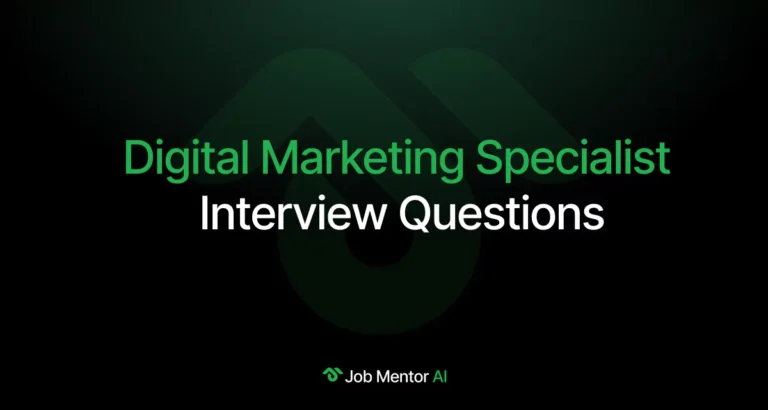
Digital Marketing Specialist Interview Questions
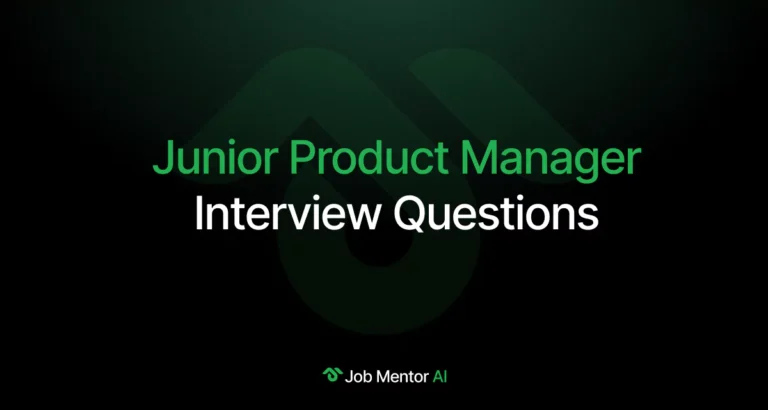
Junior Product Manager Interview Questions
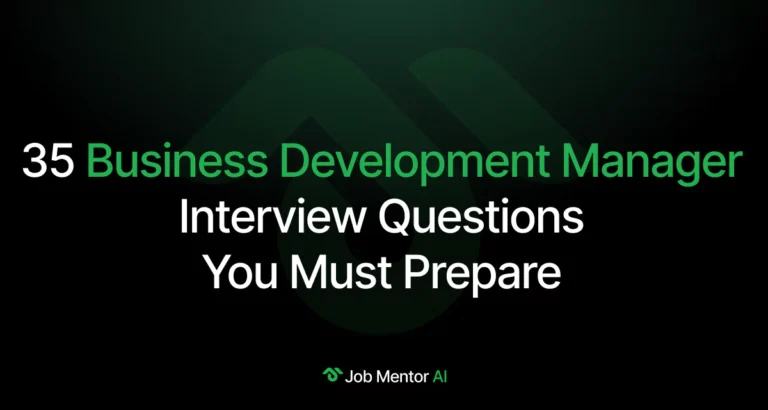
35 Most Common Business Development Interview Questions

Top 40 SOC Analyst Interview Questions
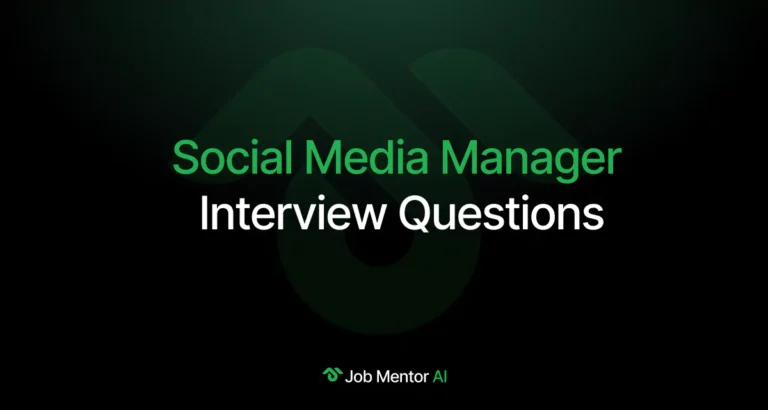
Social Media Manager Interview Questions
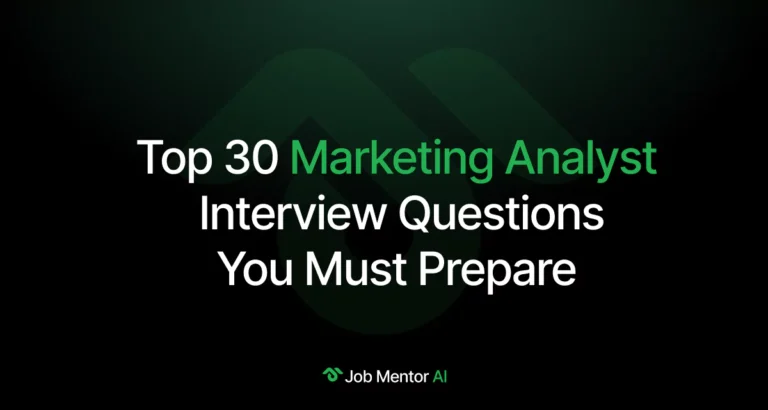
Top 40 Marketing Analyst Interview Questions You Must Prepare

